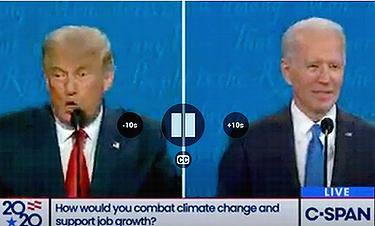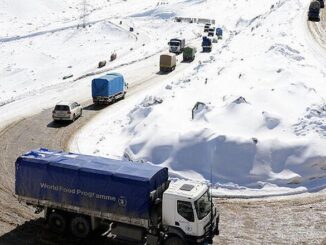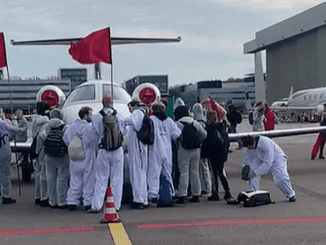
NASHVILLE, Tennessee, October 23, 2020 (ENS) – Republican President Donald Trump and his challenger in the November 3 election former Vice President Joe Biden, the Democratic presidential nominee, faced off in their second and final debate Thursday night. They disagreed on everything – especially climate change.
The event was held in person under coronavirus restrictions at Belmont University in Nashville, with Kristen Welker of NBC News as moderator. A mute button was in play after a raucous first debate in September when Trump constantly interrupted and shouted insults at Biden, not allowing any real discussion of the issues.
Welker had no involvement in the operation of the microphones or the mute button. The nonpartisan, non-profit Commission on Presidential Debates produced last night’s televised event, and a producer from the commission managed the microphones.
Trump started his answer to Welker’s climate change question, “How would you both combat climate change and support job growth at the same time?” with a lie. “So we have the trillion trees program, we have so many different programs,” he said.

The lie lies in the word “we”. Trump could not have meant that the United States initiated or exclusively conducts the trillion trees program. In fact, the 2020 World Economic Forum, held in Davos, Switzerland in January, announced the creation of the One Trillion Tree Initiative platform for governments, businesses, and civil society to provide support to the UN Decade on Ecosystem Restoration (2020-2030). The initiative is led by the UN Environment Programme, UNEP, and the UN Food & Agriculture Organization, FAO.
As a forum participant, President Trump announced that the government of the United States would commit to the initiative.
The next sentence contained another lie, when Trump said, “We have the best, lowest number in carbon emissions…”
In fact, data compiled by the International Energy Agency, which estimates carbon dioxide (CO2) emissions from the combustion of coal, natural gas, oil, and other fuels, including industrial waste and non-renewable municipal waste, shows the United States is the second-largest emitter of CO2 at 15 percent of the global total, while China is the largest emitter at 28 percent. India, Russia and Japan are third, fourth and fifth.
Trump criticized these other countries for their emissions, saying, “Look at China, how filthy it is. Look at Russia. Look at India. It’s filthy. The air is filthy.’
Trump took credit for “the best carbon emission numbers that we’ve had in 35 years,” and CO2 emissions are at a record low, but that’s because the pandemic restrictions have favored Americans working from home and prevented them from driving, not because of any Trump policies.
In fact, Trump dismantled the Obama-era fuel efficiency standards, making it easier for automakers to avoid higher levels of emission control. And that’s just one of the many environmental rules that Trump has rolled back since he took office in January 2017.
In three years, the nonprofit, public interest law firm Earthjustice has filed more than 100 lawsuits to defend environmental and health protections. Rulings on the merits of 50 of those lawsuits have now been decided. Earthjustice has won 41 of the battles — more than 80 percent of the legal challenges decided to date.
In one court ruling after another, federal courts have blocked the administration’s attempts to reverse environmental protections.
For instance, in March 2018, a federal court ruled the U.S. Environmental Protection Agency must tell the public where smog levels exceed safety standards.
In July, 2020, in a victory for taxpayers, public health, and the environment, a California court invalidated the Trump administration’s rollback of the Obama-era Waste Prevention Rule that stopped flaring wasteful venting, flaring, and leaking of gas from drilling operations on federal and tribal lands.
And in August, a court directed coal-fired power plants in Pennsylvania to curb their nitrogen oxide emissions when a weak EPA rule exempted them.
During the debate Trump explained that he started formal proceedings to pull the United States out of the Paris Climate Accord, “because we were going to have to spend trillions of dollars and we were treated very unfairly.” But the Paris agreement is a voluntary accord and no country has to do anything it doesn’t want to do.
There is no authority under the Paris agreement that can remove American businesses, but Trump declared in debate, “They were going to take away our businesses. I will not sacrifice tens of millions of jobs, thousands and thousands of companies because of the Paris Accord. It was so unfair.”
And that was just Trump’s opening statement.
Biden used his two uninterrupted minutes to promote his own climate plan and the economic growth and jobs it will create.
“Climate change, climate warming, global warming is an existential threat to humanity. We have a moral obligation to deal with it. And we’re told by all the leading scientists in the world that we don’t have much time. We’re going to pass the point of no return within the next eight to 10 years. Four years of this man eliminating all the regulations that were put in by us to clean up the climate, to limit emissions will put us in a position where we’re going to be in real trouble,” Biden said.
Biden sees climate change as “a great opportunity.”
His plan to deal with the climate crisis has been endorsed by “every major environmental group and every labor group,” Biden bragged. “Labor. Because they know the future lies, the future lies in us being able to breathe. And they know they’re good jobs in getting us there. And by the way, the fastest growing industry in America is solar energy and wind … and they pay good prevailing wages, 45-50 bucks an hour. We can grow and we can be cleaner, if we go the route I’m proposing.”
“We’re going to invest in, for example, 50,000 charging stations on our highways so that we can own the electric car market in the future. In the meantime, China’s doing that,” he told Trump.
The most bitter argument arose over the oil industry. “Would you close down the oil industry?” Trump demanded of his challenger.
Biden said, “I would transition from the oil industry. Yes.” Later in the debate, he explained that the oil industry, “has to be replaced by renewable energy over time. Over time.”
Trump accused Biden of opposing fracking, the process of injecting liquid at high pressure into subterranean rocks to force open existing fissures and extract oil or gas.
“I have never said I oppose fracking,” said Biden. “Fracking on federal land, I said. No fracking or oil on federal land.”
“I do rule out banning fracking because we need other industries to transition to get to, ultimately, a complete zero emissions by 2025. What I will do with fracking over time is make sure that we can capture the emissions from the fracking. Capture the emissions from gas. We can do that,” Biden said.
Biden did say he’s in favor of eliminating government subsidies for fossil fuels.
Trump has encouraged the oil industry to drill on public lands, including the Arctic National Wildlife Refuge in Alaska that has been pristine forever.
Rather than wanting to transition away from the oil industry, Trump is proud of it. “We are energy independent for the first time,” he declared. “We don’t need all of these countries that we had a fighting war over because we needed their energy. We are energy independent.” Later in the debate, he said, “We saved our oil industry and now it’s very vibrant and everybody has very inexpensive gasoline.”
Trump accused Biden of intending to “destroy the oil industry.” “Will you remember that Texas? Will you remember that Pennsylvania? Oklahoma? Ohio?” the president demanded.
Biden did not back down, but said, “He takes everything out of context, but the point is, look, we have to move toward a net-zero emissions. The first place to do that by the year 2025 is in energy production. By 2050, totally.”
Copyright Environment News Service (ENS) 2020. All rights reserved.
© 2020, Environment News Service. All rights reserved. Content may be quoted only with proper attribution and a direct link to the original article. Full reproduction is prohibited.



